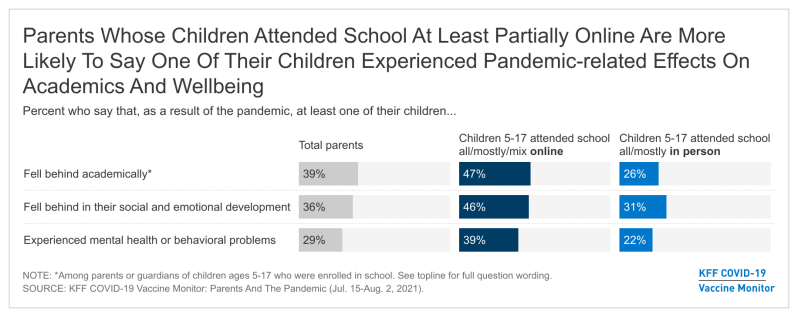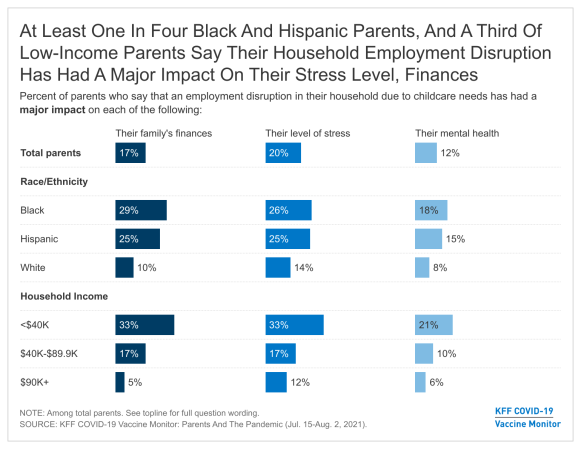
The independent source for health policy research, polling, and news.
Four in Ten Parents of School-Aged Children Say a Child Fell Behind Academically Due to the COVID-19 Pandemic
Parents of Children Who Attended Online School Are More Likely to Report Children Experienced Pandemic-Related Impacts on Academics and Mental Health
Four in Ten Parents Say Someone in Their Household Left a Job or Worked Fewer Hours to Care for Their Children, Including Higher Shares of Black, Hispanic, and Lower-income Parents
As a result of the pandemic, about four in ten (39%) parents of school-aged children (ages 5-17) say at least one of their children fell behind academically, rising to half among parents with household incomes below $40,000 (51%) and Hispanic parents (50%), a new KFF Vaccine Monitor report shows.
Among parents of children under age 18, more than a third (36%) say at least one of their children fell behind in social and emotional development because of the pandemic and about three in ten (29%) say a child experienced mental health or behavioral problems.
Parents whose children attended school at least partially online in the previous school year are more likely than parents whose child attended school all or mostly in-person to say they had a child who fell behind academically (47% vs. 26%) or in their social or emotional development (46% vs. 31%), or experienced mental health or behavioral problems (39% vs. 22%). These differences persist even after controlling for demographic differences including gender, race/ethnicity, income, parents’ education level, and whether children attended a public or private school.
Parents Report Pandemic-Related Emotional and Mental Health Problems for Both Their Children and Themselves
In the past 12 months, about four in ten parents (42%) say their children experienced a new mental health symptom that they did not experience prior to the pandemic, including difficulties concentrating on schoolwork (27%), nervousness or being easily scared (19%), sleeping problems (18%), poor appetite or overeating (15%), or frequent headaches or stomachaches (11%).
A smaller share (17%) of parents say their children received mental health services in the past 12 months and 11% say there was a time they thought their child needed mental health services or medication but did not get them. The main reason parents cite for why their children were unable to receive mental health services was that they could not find a provider (32%).
Many parents themselves report experiencing negative mental health impacts as a result of the pandemic. A majority of parents (54%) say that worry and stress related to the pandemic has had a negative impact on their mental health. Mothers, Black and Hispanic parents, lower income parents, and parents with recent employment changes are among the groups most likely to report experiencing mental health challenges.
More Than Half of Black Parents and Low-Income Parents Left a Job or Changed Schedules to Care for Their Children During the School Year
About four in ten parents say that they or someone else in their household left a job or changed work schedules in the past year in order to care for their children. Black (53%) and Hispanic (44%) parents are more likely than White parents (32%) to say their household suffered a job disruption due to childcare needs, as are parents with lower incomes (51% of parents with household incomes under $40,000) compared to those with higher incomes (35% of those with incomes of $40,000 or more).
Among parents who say they left a job or changed their work schedule to care for their children during the pandemic, over half (54%) say they still have not returned to a pre-pandemic work schedule, representing one in five (21%) of all parents. Roughly four in ten lower-income parents (39%), one-third of Black parents, and one-quarter of Hispanic parents say their household had a work disruption and has still not returned to their pre-pandemic job or hours.
Many parents report that these employment disruptions due to childcare needs have had a negative impact on their stress level, family finances, and mental health, including larger shares of Black and Hispanic parents and those with lower incomes. About one in four Black and Hispanic parents say their household experienced a childcare-related employment disruption that has had a major impact on their family’s finances and on their stress level. Among parents with household incomes under $40,000, one-third report a household employment disruption that has had a major impact on their stress level (33%) or their family finances (33%) and one in five (21%) report such a disruption has had a major impact on their mental health. The shares reporting these impacts are much lower among White parents and those with higher incomes.
The new report shows that parents who experience household employment disruptions due to childcare are more likely to report that their children fell behind academically (51% vs. 32%), fell behind in social and emotional development (49% vs. 28%), or experienced mental health problems (41% vs. 21%) compared to those that did not have an employment disruption during the pandemic.
Designed and analyzed by public opinion researchers at KFF, the KFF Vaccine Monitor: The Impact of The Coronavirus Pandemic On The Wellbeing Of Parents And Children was conducted from July 15-August 2 among a nationally representative probability-based sample of 1,259 parents with a child under age 18 in their household. Interviews were conducted in English and Spanish, online (908) and via telephone (351). The margin of sampling error is plus or minus 4 percentage points for the full sample. For results based on subgroups, the margin of sampling error may be higher.
The KFF COVID-19 Vaccine Monitor is an ongoing research project tracking the public’s attitudes and experiences with COVID-19 vaccinations. Using a combination of surveys and qualitative research, this project tracks the dynamic nature of public opinion as vaccine development and distribution unfold, including vaccine confidence and acceptance, information needs, trusted messengers and messages, as well as the public’s experiences with vaccination.

